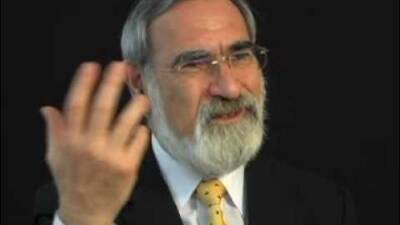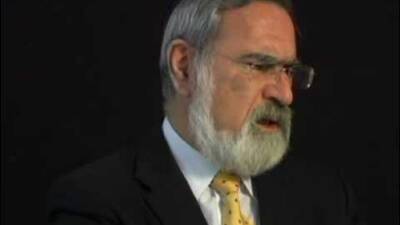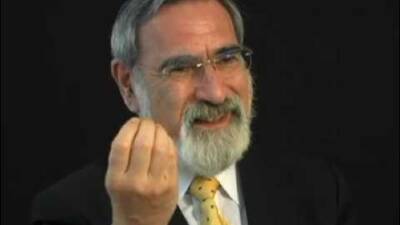Share
When you lose so much of what you had, that’s tough. Judaism doesn’t seek to minimise that fact. There’s a prayer, Hashem yimloch et reiecha - May God give you back what you lost. We are not indifferent to this sense of bereavement, almost. When we lose some of our savings, worse still we can lose our job. Judaism is not a religion of denial. It’s not a religion that says reality doesn’t sometimes hurt. It hurts. And there are moments when you can be very bleak indeed. But the truth is, and I think all of us somehow know this, that it’s sometimes the hardest times, that years later, we look back at in retrospect and see those were the times when I learned most of all, when I suddenly discovered what I’m really about, what really matters to me, what my meaning in life really is.
Now it’s hard to see that at the time, but when you look back 5, 10 years later, you realise that moment of loss was a moment of truth and the beginning of a new life. The reason is obvious when things are going well, we don’t stop to ask: Who am I? Why am I here? What’s my purpose in life? It’s only when things get really seriously bad. That is when we asked that question.
Now, it’s not easy in the midst of loss to think, 'Oh guys, 10 years from now, I’ve going to look back at this and smile!' because in the meantime you’re weeping. But I do honestly believe that that is a time to put your faith in God, to say your prayers, know that God is going to reach down a hand that stops you drowning. He will get you through.
It’s a time when you need the support of friends and family. It’s a time when you really do need to go to the synagogue, to the house of worship, because community helps as well. It’s the time when that whole network of support really matters and they have to get you from here to there. But when you undergo great loss, you will know whether ‘there’ is supposed to be more clearly than at any other time in your life. That is why you may look back at the bad times and give thanks for them.
So I don’t know if this helps, but there will come a time when you will realise that worst times were, in a strange sense, the best times. When things are bad, when you lose your savings, even worse, when you lose your job, life can seem very black, very dark. The worst thing of all is you can’t see the future. That’s really the worst. And at such moments, Judaism does not attempt to cheer you up. We recognise that there can be real moments of crisis in life. We have a prayer. Hashem yimloch et reiecha, may God fulfil what you’ve lost. May He give it back to you in some other way.
I will say this, the Chinese have been around for a long time, 5,000 years. One of the reasons might just be that the Chinese idiogram that stands for 'crisis' also means 'opportunity'. So Chinese knew how to deal with crisis, and that’s how a culture survives. It’s also how an individual survives.
I only know one language in the world that goes one further than the Chinese and that’s Hebrew. The Hebrew for crisis is mashber. Now, if you ask what does mashber really mean? It means a birthing stool, what midwives used to use when they were helping a mother give birth. In other words, in Hebrew, a crisis is the birth pangs of something new. Believe you me, just trust Jewish instinct and realise that this moment of crisis in your life is also when something new is being born.
I think seeing things that way has helped me personally, through crisis.
More JInsider Videos

Rabbi Sacks on the Jewish Narrative
JInsider (March 2010)

Rabbi Sacks on Future Tense Take Aways: Part 1
JInsider (March 2010)

Rabbi Sacks on Future Tense Take Aways: 2
JInsider (March 2010)

Rabbi Sacks on the Universal Jewish Story
JInsider (March 2010)

Rabbi Sacks on Eco-Judaism Roots
JInsider (March 2010)

Rabbi Sacks on Peoplehood
JInsider (March 2010)

Rabbi Sacks on an Engaged Judaism
JInsider (March 2010)

Rabbi Sacks on Charity Priorities
JInsider (March 2010)

Rabbi Sacks on a Responsible Life
JInsider (March 2010)

Rabbi Sacks on Reconciliation
JInsider (March 2010)

Rabbi Sacks on Community Conflict
JInsider (March 2010)

Rabbi Sacks on Particularism vs Universalism
JInsider (March 2010)

Rabbi Sacks on a Culture of Hope
JInsider (March 2010)

Rabbi Sacks on his Personal Hatikvah
JInsider (March 2010)

Rabbi Sacks on Israel and Jewish Society
JInsider (March 2010)

Rabbi Sacks on Torah in Today's World
JInsider (March 2010)

Rabbi Sacks on Prayer
JInsider (March 2010)

Rabbi Sacks on Indifference
JInsider (March 2010)

Rabbi Sacks on the Jewish Role in the World
JInsider (March 2010)

Rabbi Sacks on Torah and the Real World
JInsider (March 2010)

Rabbi Sacks on Free Market and Judaism
JInsider (March 2010)

Rabbi Sacks on Antisemitism
JInsider (March 2010)

Rabbi Sacks on Future Tense
JInsider (March 2010)

Rabbi Sacks on Love as Deed
JInsider (March 2010)

Rabbi Sacks on Combatting Antisemitism
JInsider (March 2010)

Rabbi Sacks on the Antidote to Materialism
JInsider (March 2010)

Rabbi Sacks on Parenting
JInsider (March 2010)

Rabbi Sacks on a Tzedakah Tale
JInsider (March 2010)

Rabbi Sacks on a Family Story
JInsider (March 2010)

On the Internet and Judaism
JInsider (March 2010)

Rabbi Sacks on Plato's Ghost
JInsider (March 2010)

Rabbi Sacks on Optimism vs. Hope
JInsider (March 2010)

Rabbi Sacks on Victim Mentality
JInsider (March 2010)

Rabbi Sacks on Jerusalem
JInsider (March 2010)

Rabbi Sacks on Advice for our Times
JInsider (March 2010)

Rabbi Sacks on Fundamentalism
JInsider (March 2010)

Rabbi Sacks on Time
JInsider (March 2010)

Rabbi Sacks on the Chosen People
JInsider (March 2010)

Rabbi Sacks on 21st Century Israel
JInsider (March 2010)

Rabbi Sacks on the Origins of Antisemitism
JInsider (March 2010)

Rabbi Sacks on Understanding Jewish Exile
JInsider (March 2010)

Rabbi Sacks on Anger
JInsider (March 2010)

Rabbi Sacks on the Historical Evolution of Antisemitism
JInsider (March 2010)

Rabbi Sacks on Interfaith Relations
JInsider (March 2010)

Rabbi Sacks on Coincidence and Providence
JInsider (March 2010)

Rabbi Sacks on Free Will
JInsider (March 2010)

Rabbi Sacks on Family and Marriage
JInsider (March 2010)

Rabbi Sacks on Tzedakah Defined
JInsider (March 2010)

Rabbi Sacks on Daily Life
JInsider (March 2010)

Rabbi Sacks on Being Jewish
JInsider (March 2010)

Rabbi Sacks on his Personal Rebbe, Rabbi Nachum Rabinovitch
JInsider (March 2010)

Rabbi Sacks on Connecting to God
JInsider (March 2010)

Rabbi Sacks on God and Evil
JInsider (March 2010)

Rabbi Sacks on Dialogue with Atheists
JInsider (March 2010)

Rabbi Sacks on Doubt
Jinsider (March 2010)

On Tikkun Olam
JInsider (March 2010)

Rabbi Sacks on a Response to Atheism
JInsider (March 2010)

Rabbi Sacks on Finding Purpose
JInsider (March 2010)

Rabbi Sacks on a Responsible Life - Example
JInsider (March 2010)

Rabbi Sacks on the Dignity of Difference - Part 2
JInsider (March 2010)

Rabbi Sacks on the Dignity of Difference - Part 1
JInsider (March 2010)
